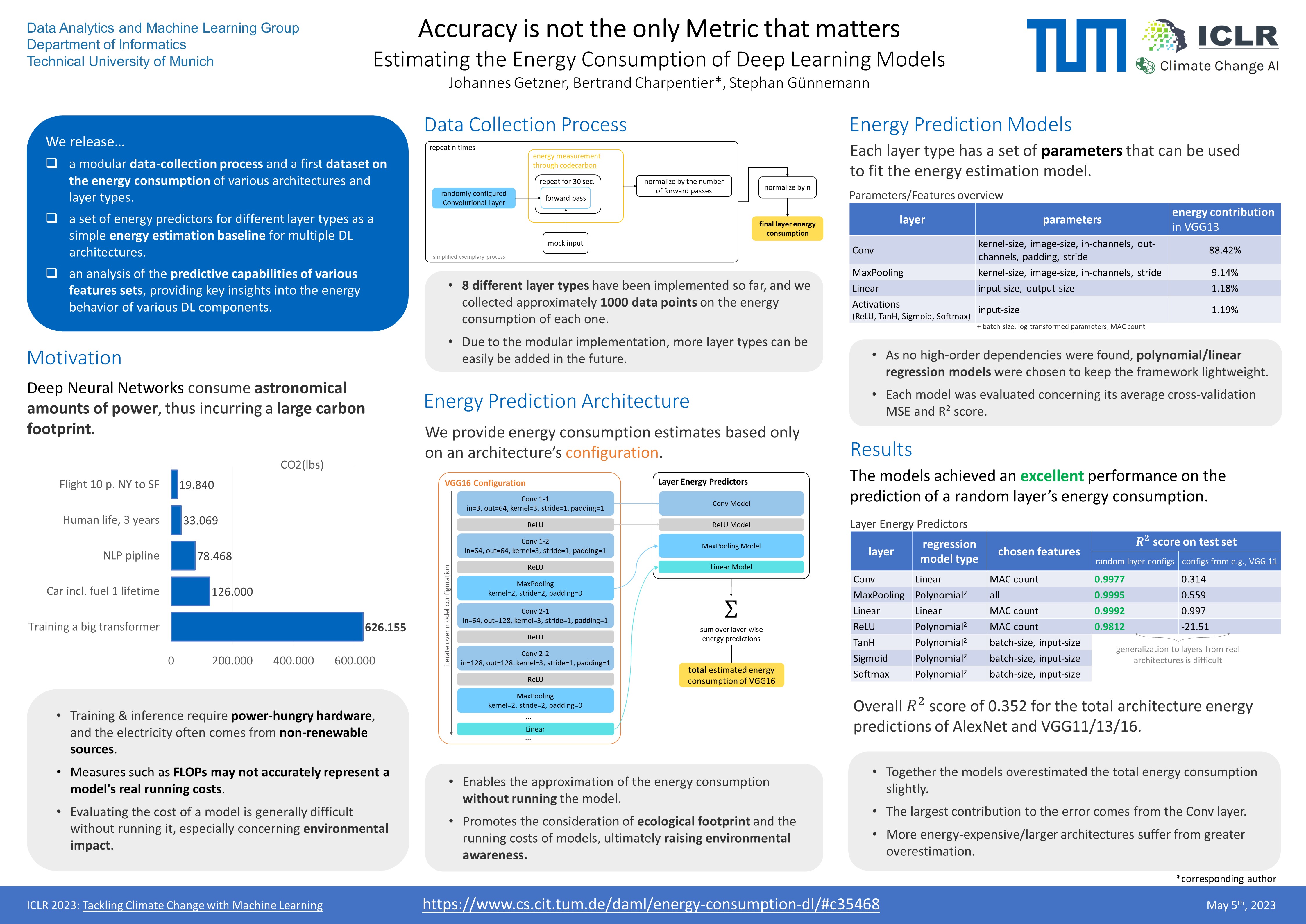Accuracy is not the only Metric that matters: Estimating the Energy Consumption of Deep Learning Models
This repository contains the sourcecode to the paper:
Accuracy is not the only Metric that matters: Estimating the Energy Consumption of Deep Learning Models
Johannes Getzner, Bertrand Charpentier, Stephan Günnemann
Spotlight, Tackling Climate Change with Machine Learning Workshop, ICLR 2023
- ./data contains the raw file outputs by codecarbon, the '...slurm-log.out' files correspond to the log files from the cluster the collection process was run on and are used to remove potentially bad measurements.
- ./data_collectors contains the parent DataCollector class and the corresponding child-class implementations for each module used in the data-collection process. To add a new layer e.g. AdaptiveAvgPooling, a new data-collector needs to be implemented.
- ./estimator contains everything related to the final predictors on both the layer- and architecture-level
- ./data contains the parsed and normalized data files used for training (see the generate_datasets.ipynb notebook for details)
- ./models contains the custom model classes that implement the best models for each layer type
- ./serialized_models contains the serialized trained energy predictors, pre- and postprocessors for each layer-type
- ./experiments contains a set of jupyter notebooks with the results presented in the paper
- ./utils a set of python scripts that contain useful custom functions
- ./ besides the above, the .yaml files are required for the configuration of the data-collection, training and inference process. See the 'run_....py' files for more details
To install the necessary packages run the following command:
pip install -r requirements.txt
codecarbon reads the Intel RAPL files for the energy information. Before the data-collection process can run, make sure
your system allows these files to be read: sudo chmod 555 -R /sys/class/powercap/intel-rapl/ (
see ./give_RAPL_read_access.sh)
We developed a pipeline to (1) collect data on the energy consumption of various DL layer types and architectures such as VGG16, (2) fit simple energy predictor models on this energy data, and (3) evaluate the energy predictors on new data, by predicting the energy consumption of complete architectures.
Before attempting to start the process to collect new data, please review the data_collection_config.yaml file in the
root of the
repository. Subsequently, the data-collection process can be started by simply running python run_data_collection.py.
Note that pre-collected data is already available in the ./data folder.
Before running the model fitting procedure make sure that the parsed and normalized datasets are available in the
./estimator/data folder. One may also use the ./estimator/generate_datasets.ipynb notebook to automate this
process.
The model fitting procedure uses the models implemented in ./estimator/models. If model configurations are to be
changed please review those files.
Finally, before running the model-fitting process via python run_fit_models.py, please review the
./model_fitting_and_estimation_config.yaml configuration file. After the run has finished, the serialized models will
be saved automatically in
./estimator/serialized_models.
Given the serialized models, the system is capable of estimating the energy consumption of a variety of architectures.
By running python run_estimation.py the system will attempt to predict the energy consumption of the models specified
at the beginning of the model_fitting_and_estimation_config.yaml.
First and foremost, I would like to express my deep gratitude to my supervisor Bertrand Charpentier, from the DAML Group at the Technical University of Munich, led by Prof. Dr. Stephan Günnemann, for his unwavering support, guidance, and valuable feedback throughout the entire duration of this project. His insights and expertise were crucial in shaping the direction of our research and bringing it to success. Without their constant support and encouragement, this work would not have been possible.
Additionally, I would like to acknowledge the contribution of my former group member Ahmed Darwish, who provided valuable code during the early stages of this project. Thank you for your help.
@misc{dlenergyestimator,
title={Accuracy is not the only Metric that matters: Estimating the Energy Consumption of Deep Learning Models},
author={Johannes Getzner and Bertrand Charpentier and Stephan Günnemann},
year={2023},
primaryClass={cs.LG},
howpublished = {\url{https://arxiv.org/abs/2304.00897}},
note={Tackling Climate Change with Machine Learning Workshop by Climate Change AI (ICLR 2023)}
}
